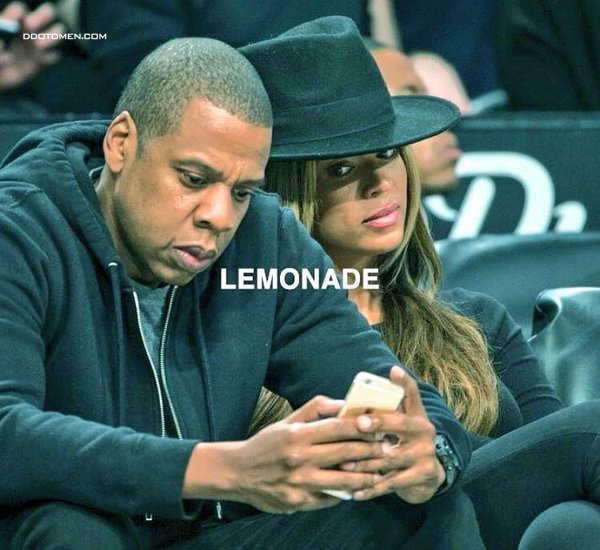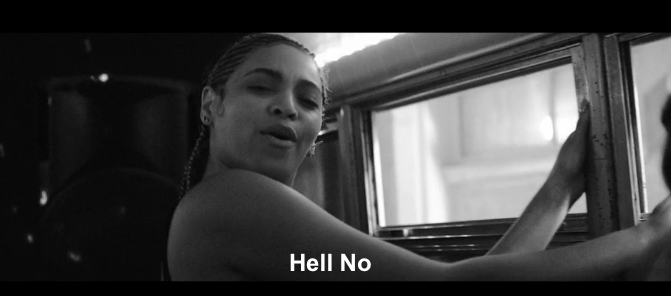
Obviously, I watched Beyonce’s Lemonade several times, and loved it. Obviously. And then obsessively called the two people I knew would watch it until they’d watched it, so we could recap.
One observed: “She’s so dramatic!”
For those of you who haven’t seen it, the visuals attach the struggles of the singer’s marriage to the plight of black women everywhere. She’s not just been wronged by her husband, she’s been wronged by society – so the sting of his cheating is that much worse. As if she’s not given enough respect at large, she has to deal with shit at home, too?
For some, the drama might have been too much. For me? Not at all. I’m dramatic myself, so I appreciated her panache.
I cannot imagine the betrayal. Everyone’s home should be a shelter: your home is where you go when work gets tough, or your days are hard. For black women, days are harder. In Lemonade, she goes beyond simply trying to make a home with her husband – she talks about making a home from him, inside him. Which, you would: and you do. The word “husband” even comes from the old Norse word for “house”. When I am lying next to my husband, that is my home: he’s my reward for hard work.
So, to find that home is not a sanctuary at all? That he didn’t feel you were his reward? That he was sneaking out the back door? That he’s holding back from you, lying to you?
In a heartbreaking work of poetry, she says, spiteful: “I can wear her skin over mine. Her hair over mine.” She later refers (now famously) to “Becky with the good hair”: “Becky” is not a black woman. Her hair is “good”: he’s betrayed her for a non-Black woman, and the poet will try to change her hair and skin.
Out in the world, she’s told to change her hair and skin: to be told that in your home, too? Foul! The spite is directed at the lover: “your perfect girl” is a taunt. “We can pose together for a photograph” – she is going for blood, because he knows. He knows what it’s like to want to change his skin: she’s rubbing it in, using the pain she felt to hurt him.
Of course, you don’t have to be black to identify with the album. You also don’t have to be as wealthy and successful as Beyonce to identify with the album, either. I’ve taunted like that myself, albeit about other things (um, obviously); I’ve said: “When you hurt me, you hurt yourself.”
So often, I’ve felt pressure to be more “fun” or more “cool”. I have an anxious streak, so being “fun” does not always come easily to me. (Unless you get off on anxiety. Then, you should call me. ;)) When she sings: “know that I kept it sexy, and know I kept it fun”, I thought: “Damn”.
Because you only know that when you’ve consciously tried to keep it sexy or fun for someone. You know only know that when you’ve had to think about it; when you’ve been angry or been sad and worried about those emotions showing through, enough to think: “no, no – keep it cool”. The unspoken fear is that if you don’t keep it sexy or fun, he’ll lose interest and leave you, for someone easier.
You know who would be easier than a black woman? Someone who hasn’t had to face as much adversity, like a woman who isn’t black.
Here, the artist is doubly betrayed (maybe even triply): not just because he stepped out (and turned to a non-black woman), but also because the promise itself was wrong: she did what she was supposed to do, and he still lost interest.
And she’s angry about all of it. If you simply listened to the music, it would be easy to think: “she’s just mad about the cheating”; it’s the visuals that underscore how angry she is at the pressure she felt to “keep it sexy” – that women feel this pressure, that the pressure is a lie, and that there’s a double-standard. She is gloriously, magnificently angry. She is the dragon breathing fire, and there is fire everywhere.
I imagine many women can identify with this. As a review in the New Yorker noted: “Lemonade declares that misogyny is at its most potent and complex within the bonds of love.”
Amen. Hell hath no fury.
Men have more power than women. They earn more money; they’re given more. They have more social capital. Often, they have so much, they may not even be aware that they, personally, are benefiting from inequality. It doesn’t matter who you are, as a woman: if you are a woman, no matter how hard you work or how smart you are, there is a man out there who has more, simply because he is a man.
So, given this imbalance, as a woman, how do you have a loving relationship with a man? Can a man ever truly love you if he will never understand your struggle? What does “love” with a man look like, in a long-term partnership, in the face of persistent inequality?
I ask myself this last question more often than not. And then I think: “What would it feel like to be Hillary Clinton?”
Luckily for me, I’m a far worse actress than Beyonce (this will be shocking for those who saw the 2006 Pink Panther film, or that Austin Powers one): as much as I feel I should try to keep it sexy or fun, my emotions run unbridled regardless. I will never be able to say: “But I was so chill!” Which means, I can’t get too angry about that particular double-standard… I succumb to no pressure that tells me to “keep it cool”.

But I do wonder what relationships in general would look like if women never felt pressure to keep it sexy or fun – if there was no pressure on a woman to hold the interest of her partner. Would Victoria’s Secret exist? I wonder, as a percentage, how many men worry about holding the interest of their wives, compared to women worrying about holding the interest of their husbands.
I wonder if one feels more pressure to keep it cool when they are dependent on their partner for the roof over their head and the food on their table? Or for safety?
If you do feel pressure to keep it cool/sexy/fun for your husband, are you every angry about it? Are you ever angry not just that you feel the pressure at all, but also because he may never feel pressure to keep it cool/sexy/fun for you?
Does it make you jealous?
When I think of the Beyonce song, Jealous, I think the singer wasn’t jealous of the other women he may be out with, but that she was jealous of him – of her husband himself.
I bet a lot of women in relationships with men struggle with jealousy: not of other women, but of their partners. I once had a conversation with a woman who confided she was sometimes jealous of her husband for his career successes, though she directly benefited from them: “It’s great for us, it’s great for our life. Yes, he’s worked for them. But I have to bite my tongue. He’s tall and blond and a man. I want those successes too. I have to work so much harder to get them.”
Feeling that way is difficult: you love someone, but you want what they have. You want their power for your own. But you must be silent about it, you must stifle it. You must just love your husband and be gentle and kind to him.
So when he betrays you? It’s not just the betrayal of the bond, it’s the abuse of power.
Some women, of course, cannot identify with this. Some women, and men, are untroubled. “Those feminists are always getting mad about something. Everything is working fine!”
Beyonce is not one of those people. Beyonce does not accept this. The last interview with Beyonce offers a quote from Life is But a Dream (which, of course, I’ve seen):
“You know, equality is a myth, and for some reason, everyone accepts the fact that women don’t make as much money as men do. I don’t understand that. Why do we have to take a backseat?” she says in her film, which begins with her 2011 decision to sever her business relationship with her father. “I truly believe that women should be financially independent from their men. And let’s face it, money gives men the power to run the show. It gives men the power to define value. They define what’s sexy. And men define what’s feminine. It’s ridiculous.”
Beyonce wants power; she wants money; she wants freedom. Perhaps this is why, for me, Freedom was one of the most moving songs on Lemonade: she is going to break those chains all by herself, including the chain that makes the singer feel she needs to be “fun” for her husband – her love for him has become a chain. He has taken her love for granted; instead of making her stronger, her devotion to him has caused her pain.
It’s hard not to think: “Oh, so that’s why she did about the least (but also most!) “cool” thing you can do. She put together a whole album, a whole film, about her rage. She put it all on display: all that anger. So she could turn the pain into something beautiful.”
It’s hard not to say that, because we don’t know: we don’t know that this is what happened to her; we don’t know that this album is about Beyonce claiming power in her own marriage; it may just be about any woman claiming power in her marriage after a betrayal.
It’s a testament to the album that it provoked such a visceral response. If it’s not about the artist’s own struggle, she is the best actress I’ve ever seen (Foxxy Cleopatra be damned!).
There’s only one way to overcome jealousy: it’s to acknowledge it for what it is, and then to go out and get it – to go out and claim for yourself whatever it is you’re coveting. You’re jealous because your husband doesn’t try to be sexy for you? Don’t try so hard for him. You’re jealous because your husband is successful? Go get your own success. Are you angry because he was your sanctuary from all that was wrong with the world, and you lost that sanctuary? Go face the world bravely and get yourself a new one.
I learned, just now, that while “husband” comes from the word for “house”, the word “wife” comes from the word for “woman”. Maybe women are supposed to stand alone, even as wives.
The best marriages I’ve seen are the ones where both parties stand alone, but next to each other. Where one is not fighting an internal battle to be different for the other, and where both parties respect one another’s boundaries and trust. I believe this is the only kind of marriage worth having.
But, you know, it’s a process. And Lemonade was a beautiful homage to that process: of pain, hurt, healing and personal growth.

